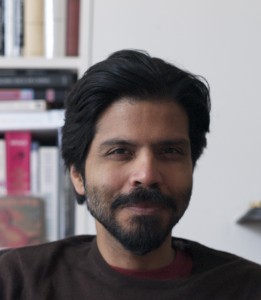I always loved Christopher Hitchens' review essays and his death was the end of the glorious days of the book review essay, I worried. Not only does hope spring eternal but a bearded male intellectual from India continues on with that lively and lovely art of book review essays.
No, I am not that bearded male intellectual from India ;) Unlike me, he has retained his youth and a mop of hair on his head! Damn those people who have it all ;) I am referring to Pankaj Mishra.
 |
| From Mishra's website |
In the normal course of events, I would have blogged this a few days ago after reading his "A love letter to Indonesia" in the New Yorker. But then I had far more important pieces to blog about--like சேவை ;)
That "love letter" is an essay in which Mishra writes about Indonesia, and more, while reviewing Elizabeth Pisani's "exuberant and wise travel book “Indonesia Etc.” (Norton)." The first two paragraphs he writes before even introducing the book the reader are awesome. Damn these writers! ;)
Mishra makes a number of wonderful observations, of which I liked the concluding paragraph quite a bit:
Indonesia is hardly immune to catastrophic breakdowns, as the anti-Communist pogrom showed. But, like India, it has been relatively fortunate in evolving a mode of politics that can include many discontinuities—of class, region, ethnicity, and religion. Indonesia can’t avoid or prevent severe conflict, but it can weather it without falling apart. The Indonesian archipelago is unlikely to descend into the violent secessionist anarchy currently on display in the Middle East and North Africa. However, what it still needs, as Geertz once argued, is a “structure of difference within which cultural tensions that are not about to go away, or even to moderate, can be placed and negotiated—contained in a country.” Such a reconfigured national consensus, or a way of doing without one, seems equally imperative in the case of Hispanic immigrants in America, Muslims in France, Palestinians in Israel, Tamils in Sri Lanka, Kurds in Turkey, and Tibetans in China. The old question—what is a country, and what is its basis?—has become menacingly relevant long after it appeared to have been settled. In that sense, it is not facile to wonder if we are all Indonesians now, facing the perplexities of a shattering old order.What is a country, and what is its basis? That summarizes pretty much every geopolitical issue of the day, right?
Israel.
Iraq.
Syria.
Ukraine.
DRC.
South Sudan.
Scotland.
... the list is endless, it seems.
As an exceptional book reviewer, Mishra always makes us think about more than merely about the book that is reviewed. I suppose that is the role of the real intellectual, especially those with a whole lot of youth and hair!
2 comments:
Never heard of Pankaj Mishra - knowing one bearded "young" intellectual is enough for me :)
Yes, what is a country indeed. Most of what is unraveling is what the Brits in smoky pubs drew as straight lines on a world map.
If only we can all freeze countries as they stand presently, good , bad or ugly, and learnt to live in harmony with whoever the neighbour was. After all there is a good chance that he too is young, bearded, intellectual ......
Yes, as I often joke with students, most of the geopolitical problems of today can be blamed on the British Empire. And we can learn a lesson or two from that.
Britain was the superpower of its day. The US is the sole superpower now. Chances are, therefore, really really good that the US will be blamed for most (all?) of the geopolitical problems--now and into the future.
One would think that, therefore, the US would be careful and cautious ... well, one would think so!
You have not heard of Pankaj Mishra? He is one deadly firecracker with his knowledge and language ... I don't ever want to be on his bad side ;) An old-school intellectual, i would think, unlike the noisy public ones like A. Roy ...
Post a Comment